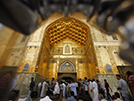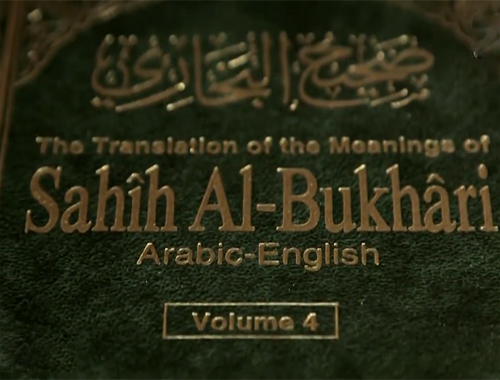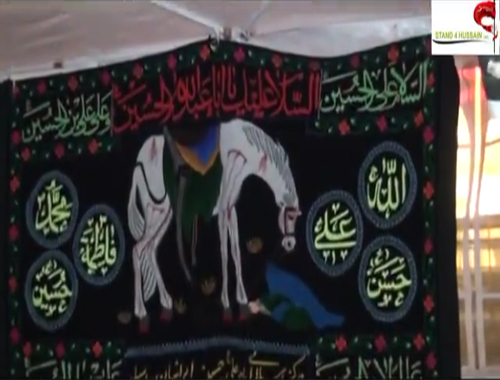THE SPIRITUAL PHILOSOPHY OF OFFERING SACRIFICE
- Details
- Hits: 2898
THE SPIRITUAL PHILOSOPHY OF OFFERING
SACRIFICE
A believer who, due to staying in Arafat and al-Mash'ar, has come to the position of fully getting to know God and has undermined his carnal desires will not naturally hesitate to sacrifice whatever exists on his way in order to get close to his Beloved even if that being is his endeared son, life, and desires. Nevertheless, the Beloved, out of
--------------------------------------------------------------------------------
( 130 )
kindness and in consideration of His servant's weakness, is content with the sacrifice of an animal and accepts it as symbol of self-sacrifice in His way provided that the servant, by sacrificing this animal, sacrifices his bestial inclinations such as greed, jealousy, love of position and fame, mischief, pessimism, and other vices, saying with firmness: وَجَّهت٠وَجهÙÙŠÙŽ Ù„ÙلذÙÙŠ Ùَطَرَ السّماوات٠والأرْضَ.
?Surely I have turned myself, being upright, wholly to Him Who originated the heavens and the earth. (The Holy Quran; 6:79)?
While doing this, he should remember the Quranic Verse: لَنْ يَنَالَ اللهَ Ù„ÙØÙومÙهَا وَلا دÙمَاؤÙهَا ÙˆÙŽÙ„ÙŽÙƒÙنْ يَنَالÙه٠التَّقْوَى Ù…ÙنْكÙمْ
?There does not reach Allah their flesh nor their blood, but to Him is acceptable the guarding (against evil) on your part. (22:37)?
God truly seeks His servant's piety and this virtue cannot be obtained save by killing carnal desires and Satanic temptations. وَأَمَّا مَنْ خَاÙÙŽ مَقَامَ رَبّÙÙ‡Ù ÙˆÙŽÙ†ÙŽÙ‡ÙŽÙ‰ النَّÙْسَ عَن٠الهَوَى ÙÙŽØ¥Ùنَّ الجَنَّةَ Ù‡ÙÙŠÙŽ المَأْوَى
?And as for him who fears to stand in the presence of his Lord and forbids the soul from low desires, 41. Then surely the garden-- that is the abode. (The Holy Quran; 79:40-1)? ÙˆÙŽØ£ÙزْلÙÙَت٠الْجَنَّة٠لÙلْمÙتَّقÙينَ
?And the garden shall be brought near for those who guard against evil. (The Holy Quran; 26:90)?
Imam Sajjad (a.s) posed the following questions to a man who had just returned from Mecca on the philosophy of Hajj: ÙعÙندَما ذَبØتَ هَدْيَكَ نَوَيتَ أنكَ ذبØتَ Øَنجَرَة َالطَّمع٠بما تمسّكْتَ به٠مÙÙ† Øقيقة٠الوَرَع٠وأنكَ اتّبعتَ سÙنَّةَ إبراهيمَ عليه٠السّلام٠بÙذَبْØ٠وَلَدÙه٠وثمرَة٠ÙÙؤادÙه٠وريØان٠قلبÙÙ‡Ù.
?When offering sacrifice, did you intend to sacrifice greed by restoring to piety? Did you pay attention to the fact that you were following Prophet Ibrahim (a.s) who took his endeared son to the sacrifice place for Allah's satisfaction?? 1
Describing the pious, Imam Ali (a.s) says:
____________
1 See al-Mustadrak; vol. 2 p. 184 section 17 hadith 5
--------------------------------------------------------------------------------
( 131 )
ميّÙتةً شَهوتÙه٠مَكظوماً غَيظÙÙ‡ÙØŒ الخَير٠منه٠مأمولٌ والشرّ٠مÙنه مأمونٌ.
?? His desires deed and his anger suppressed. Good alone is expected from him. Evil from him in not to be feared.?1
The same people, on the Day of Judgment when only the pure heart counts, will be honored by God. يَوْمَ لاَ يَنْÙَع٠مَالٌ وَلاَ بَنÙونَ, Ùإلاّ مَنْ أَتَى اللهَ بÙقَلْب٠سَلÙيمÙ
?The day on which property will not avail, nor sons except him who comes to Allah with a heart free from evil. (The Holy Quran; 26:88-9)?
Actually, Prophet Ibrahim (a.s) was not asked to sacrifice his son, but to have a pure heart: ÙˆÙŽØ¥Ùنَّ Ù…Ùنْ Ø´ÙيعَتÙه٠لإÙبْرَاهÙيمَ. Ø¥Ùذْ جَاءَ رَبَّه٠بÙقَلْب٠سَلÙيمÙ
?And most surely Ibrahim followed his way when he came to his Lord with a free heart. (The Holy Quran; 37:83-4)?
Since sacrificing an animal indicates spiritual state and free heart, it has become an act of worship among the Hajj rites: Ø°ÙŽÙ„ÙÙƒÙŽ وَمَنْ ÙŠÙعَظّÙمْ شَعَائÙرَ الله٠ÙÙŽØ¥Ùنَّهَا Ù…Ùنْ تَقْوَى الْقÙÙ„ÙوبÙ
?That (shall be so); and whoever respects the signs of Allah, this surely is (the outcome) of the piety of hearts. (The Holy Quran; 22:32)?
ECONOMIC PROFITS IN SACRIFICE
Everyone familiar with the Islamic precepts knows well that charity and helping the poor are indisputable duties of Muslims who have to allocate part of their wealth to special classes of people under Khums (one-fifth levy) and zakat (religious tax on such items as wheat, barley, raisin, etc.) In addition to obligatory charity in Islam, there are other recommended rules for helping the poor aimed at creating love among people form different classes. Islam's social programs automatically bring the rich and the poor close to each other. Friday and congregational Prayers in Hajj and everyday life bring the rich and the poor together side by side and in a single rank. Eid ul-Fitr and Eid ul-Adha are two occasions on which Muslims perform both congregational Prayer and pay alms. On Eid ul-Fitr, every Muslim is
____________
1 See Nahjul Balagha; sermon 193 ?About the Pious-
--------------------------------------------------------------------------------
( 132 )
duty-bound to pay 'fitriyah' as much as three kilos of food prevailing in the city to the needy. On Eid ul-Adha, too, it is obligatory on those in Mina and recommended for those in other countries to sacrifice an animal and give its meat to the poor. The Holy Quran says: قَدْ Ø£ÙŽÙْلَØÙŽ مَنْ تَزَكَّى. وَذَكَرَ اسْمَ رَبّÙÙ‡Ù Ùَصَلَّى?
?He indeed shall be successful who purifies himself, and magnifies the name of his Lord and prays. (The Holy Quran; 87:14-5)?
In this Verse, purification of wealth precedes prayer, though purification also implies cleansing oneself of the filth of worldly attachments. We should note that prayer consolidates man's relation with God and zakat creates love among individuals of society. Both are necessary for the happy life of society.
Offering sacrifice has a double aim?to get close to God and to receive His mercy, and secondly by distributing meat among the poor, one can win hearts of the needy and be worthy of their duaa.











